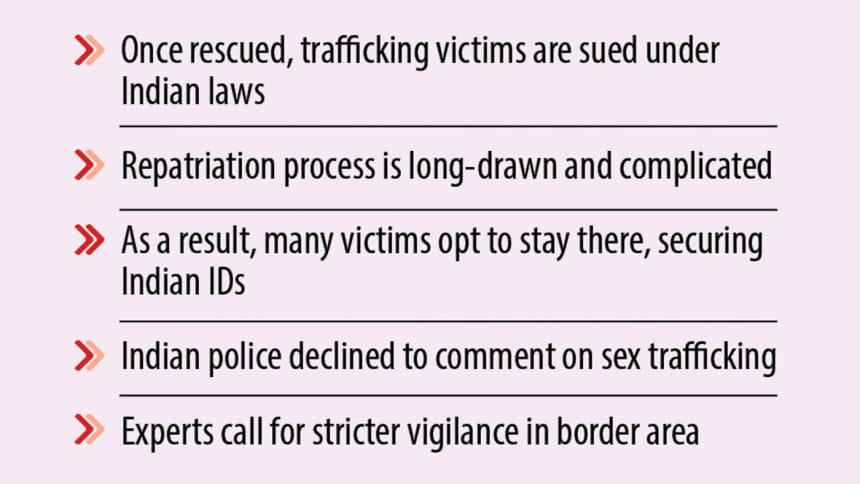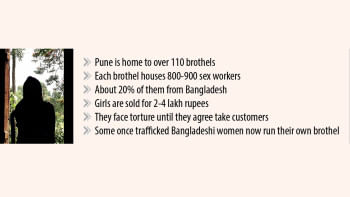No coming home

Every year, many girls are trafficked out of Bangladesh with the promise of a better life abroad, only to end up in the underbelly of cities like Mumbai and Pune, India. An investigation by The Daily Star takes a look into this dark world that involves brokers, traffickers and law enforcers on both sides of the border. This is the last part of a four-part series.
After rescuing trafficking victims, the Indian police do not take them to shelter centre; they file cases under criminal laws.
In 2017, a Bangladeshi girl Sumona (pseudonym) who was trafficked to Delhi and then to Agra was found with a customer during a police raid.
Instead of protecting her, Uttar Pradesh police filed a case against her and she was sent to jail. The jailor found out that she was a trafficking survivor and sent her to a government shelter. The superintendent of the shelter, filed another case against her for entering the country without valid documents.
According to the case statement filed with Dakshinkhan Police Station, she was trafficked on May 2, 2017.
About two weeks later, on May 20, the Agra City Police raided a brothel located in a private establishment, and arrested Sumona and four others.
Part-1: Lured to India's red light district, and a lucky escape
Part-2: Sex Trafficking: The racket on prowl at the border
Part-3: Bombaypara in Narail: a sex trafficking hotspot
According to the case documents, Sumona was discovered in a room with a customer.
Despite her status as a victim of human trafficking for commercial sexual exploitation, the First Information Report (FIR) was filed against her and the others under the Immoral Traffic (Prevention) Act, 1956, as well as under the Indian Penal Code, 1860, with Sikandra Police Station in Agra, Uttar Pradesh.

Police brought charges against Sumona that she did an obscene act in a public place.
The Immoral Traffic (Prevention) Act refers to punishment for keeping a brothel or allowing premises to be used as a brothel, living on the earnings of prostitution, procuring, inducing, or taking a person for the sake of prostitution, and detaining a person in premises where prostitution is carried on.
The legislation aims to prevent trafficking, but its provisions have been used to conduct raids and search operations, detain women and place them in shelter homes.
Tragically, Sumona, treated as an accused, was presented before the Magistrate of the Agra Court and was remanded to Agra District Jail. Although she was granted bail on June 5, 2017, she remained incarcerated.
In response to this injustice, a Writ Petition was filed before the High Court of Allahabad, Uttar Pradesh, on December 10, 2018, challenging her unlawful detention by the State.
However, on March 17, 2021, the case was disposed of without issuing any favourable orders.
On June 10, 2017, Sumona was transferred to a Protective Home operated by the government of Uttar Pradesh in Agra.
It is worth noting that due to the severe trauma resulting from continuous sexual violence, she was unable to reveal her true identity and provided an unverified address from West Bengal, India.
Subsequently, on July 10, 2018, while undergoing counselling at the Protective Home, Sumona confided in Superintendent Urmila Gupta, disclosing her actual status as a Bangladeshi national. She shared her complete address and the harrowing story of her trafficking from Bangladesh, as well as her ordeal of enduring forced sexual exploitation at multiple locations.
The superintendent of the Protective Home failed to report these critical facts and the atrocities committed against Sumona to the Court and Investigating Officer at Sikandra Police Station, and failed to initiate her repatriation process in accordance with the Memorandum of Understanding signed by the Governments of India and Bangladesh.
The superintendent also disregarded all pertinent legal procedures and proceeded to file a second FIR with Etmadaula Police Station in Agra, Uttar Pradesh, on August 4, 2019, against Sumona under the Foreigners Act, 1946, for illegal entry and stay in India.
As a result, Sumona once again appeared before the Magistrate of Agra Court and was remanded to Agra District Jail, where she has remained detained since.
Sumona appealed for bail before the Sessions Court of Agra, but her plea was denied on December 4, 2019. Charge sheets have been submitted by investigative officers before the Chief Judicial Magistrate, Agra, in both cases.
On April 5, 2023, an application for bail was submitted before the High Court of Allahabad.
The Court acknowledged that Sumona had presented a valid case for bail, and her application was granted on May 9, 2023.
The High Court of Allahabad did not impose any restrictions on Sumona that would prevent her from returning home through the established formal repatriation process.
The Agra Court released her on September 26 in the custody of a man who is originally her trafficker but posed as her relative living in India.
After the repatriation process failed, she entered Bangladesh illegally with the help of her trafficker on November 8, Mohammed Tariqul Islam, Country Director of Justice and Care, an NGO that supports trafficking victims, told The Daily Star yesterday.
Between March 2017 and October 2023, the NGO rescued around 800 women and children aged 14 to 35 in India and brought them back to Bangladesh, he said.
"So far, we have provided legal assistance in about 350 trafficking cases in different courts in Bangladesh. Out of these, 100 have been disposed of, and in seven cases, convictions were secured. Notably, all the convicted individuals were recruiters," he told The Daily Star yesterday.
CRIMINALISING THE VICTIMS
Meanwhile, sex workers' collectives in India condemn these raids and rescue operations, saying that instead of combating trafficking, it creates scopes for arresting sex workers without due process and detaining them in shelter homes where they face more abuse and violence.
A 2018 report by organisations and collectives associated with the National Network of Sex Workers, which tracked down 243 women who were picked up and detained in parts of Maharashtra between 2005 and 2017, found that almost 80 percent had not wanted to be "rescued".
Sex workers collectives have criticised the Immoral Traffic (Prevention) Act ITPA stating that it criminalises their work, their families and their right to have children. Another criticism is that the act invalidates adult consent and has created provisions for unfair and forced evictions.
In the administrative office of a shelter home in Mumbai, a staff member rushed in with a paper and said, "Look at the new order!" to another staff member.
The paper was a copy of a magistrate's order saying that seven women who were detained in a raid under the ITPA be detained for a year in a shelter home. What was surprising for the shelter home staff was that this order was passed without a report from the probation officer.
"Of the seven women who were detained, only one was a case of kidnapping and trafficking," the staff member told The Daily Star.
"The family members of the other six were present in the court yet they were not released. Now they will have to stay in a shelter home for a year, with no income. A lot of these women have children and throughout the stay they will be worried about them and will not participate in the activities in the shelter home."
To be able to leave earlier, the women will have to file an appeal which would take months and at least Rs 60,000. "They will end up taking debts and then having to work more to pay it back," said the staff member.
When it comes to Bangladeshi women, the situation gets more complicated. As many women enter India illegally, they are also vulnerable to being charged under the Foreigners Act. Many trafficking survivors who are now working as sex workers and are settled in India have got Aadhaar cards or other Indian identification documents, some real, some fake.
"Trafficking is a serious concern," said Tejaswi Sevekari, facilitator of Saheli, the only sex workers collective in Pune.
"But the sad part is that no one is addressing the issues of the safety of women and girls during the transit, be it in Bangladesh or in India. And once she has landed in the red light area or a brothel, rescuing her after a few years makes no sense. The border safety needs to be addressed properly. A woman's current status needs to be considered during the rescue operation. Most of the time, it happens without her consent."
Even those who want to be willingly repatriated face long delays. "Khushi," who came to the shelter home when she was 19, has been there for almost three years now.
"When we have to send a Nepali girl back, the process is very easy and quick," said Triveni Acharya, co-founder of Rescue Foundation, an NGO that runs shelter homes and aids police in rescue operations.
"But for Bangladeshi girls, the process is long-drawn and complicated," Triveni noted.
This delays repatriation and forces survivors to stay in shelter homes for long durations.
INDIAN IDS WITH FAKE DOCUMENTS
The Pune police declined to make any official comments.
But a senior officer with the Anti-Human Trafficking Cell of the Pune police said, "There are 110 brothels in the red light area of Budhwar Peth, which is located in the heart of the city. There are around 800 to 900 women commercial sex workers (CSWs) in these brothels."
Requesting anonymity, the officer added, "The CSWs belonged to Nepal, Karnataka, and Bangladesh. The majority of them have Aadhaar Cards and PAN [Permanent Account Number] cards."
Explaining how women are trafficked in India, the officer said, "All the women from Bangladesh have crossed the Indo-Bangla border illegally with the help of pimps. The border is very porous. The women are then kept in different lodges or hotels in Kolkata by the agents for a few days. During these days, their PAN cards and Aadhaar cards are prepared by submission of fake and fabricated documents."
"The agents generally lure the women from poor families based in Dhaka, Khulna, and other places with good and respected jobs in Delhi and Mumbai. These women are uneducated or school dropouts," he said.
"After their brief stay in Kolkata, the women are then handed over to other agents who take these women to Pune or Mumbai in the express trains. The agents generally use fake identities while communicating with the women on the express trains. The women, during their journey, are not allowed to speak with anyone else," he said.
"Once the trains reach Pune railway station, the agents hand over these women to the brothel keepers. These women are bought by the brothel keepers for a very trivial amount ranging between Rs 8000 to Rs 20,000," the officer said.
For official comments, an RTI was also filed with Pune, Mumbai, and Maharashtra police, but none of them responded to our questions about the trafficking rackets. Mumbai police only said they rescued one Bangladeshi survivor in 2022 and 2023, but no one in previous years.
Triveni Acharya, one of the founders of the rescue foundation, said they rescue around 500 girls yearly, and 20 percent of them are Bangladeshi. Even there are so many Bangladeshi "guru-ma" (brothel managers) in the brothels in Mumbai, she said.
"These girls were actually taught by the traffickers to give identity as Indian to avoid legal complications of illegal entry," Triveni added.

 For all latest news, follow The Daily Star's Google News channel.
For all latest news, follow The Daily Star's Google News channel. 





Comments